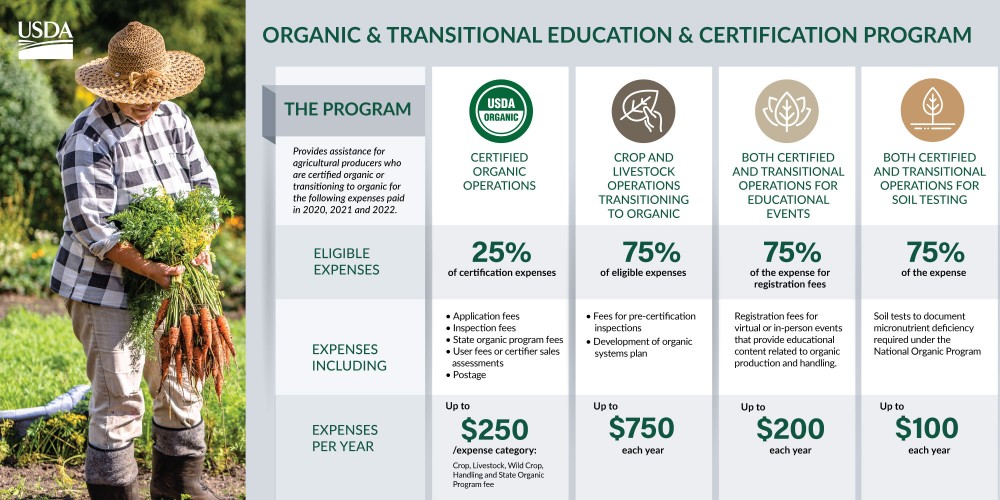USDA Offers Funding to Reimburse Farms Transitioning to Organic Production
Amy Barkley, Team Leader & Livestock Specialist
Southwest New York Dairy, Livestock and Field Crops Program
The U.S. Department of Agriculture (USDA) is providing up to $20 million to reimburse agricultural producers and handlers who are certified organic and crop and livestock producers who are transitioning to organic for eligible expenses incurred during fiscal years 2020, 2021, and/or 2022. The new program, Organic and Transitional Education and Certification Program (OTECP), is part of USDA's Pandemic Assistance for Producers initiative.
USDA's Farm Service Agency (FSA) will accept OTECP applications for fiscal years 2020 and 2021 from November 8, 2021, through January 7, 2022. The application period for fiscal year 2022 applications will be announced at a later date.
Some of the key messages including qualified expenses are:
- During the COVID-19 pandemic, certified organic and transitional operations faced challenges due to loss of markets, increased costs, and labor shortages, in addition to costs related to obtaining or renewing their organic certification, which producers and handlers of conventionally produced commodities do not incur.
- Transitional operations also faced the financial challenge of implementing practices required to obtain organic certification without being able to obtain the premium prices associated with certified organic commodities.
- USDA's new Organic and Transitional Education and Certification Program (OTECP) will provide up to $20 million to reimburse agricultural producers and handlers who are certified organic and crop and livestock producers who are transitioning to organic for eligible expenses incurred during fiscal years 2020, 2021, and/or 2022.
- OTECP funding is provided through the Coronavirus Aid, Relief, and Economic Security Act (CARES Act).
- OTECP is open to certified operations and transitional operations located in the 50 United States, the District of Columbia, the Commonwealth of Puerto Rico, Guam, American Samoa, the U.S. Virgin Islands, and the Commonwealth of the Northern Mariana Islands.
- For each fiscal year, OTECP covers 25% of a certified operation's eligible certification expenses, up to $250 per certification category (crop, livestock, wild crop, handling, and State Organic Program fee). This includes application fees, inspection fees, USDA organic certification costs, state organic program fees and more.
- Crop and livestock operations transitioning to organic production may be eligible for 75% of a transitional operation's eligible expenses, up to $750, for each year. This includes fees charged by a certifying agent or consultant for pre-certification inspections and development of an organic system plan.
- For both certified operations and transitional operations, OTECP covers 75% of the registration fees, up to $200, per year, for educational events that include content related to organic production and handling to assist operations in increasing their knowledge of production and marketing practices that can improve their operations, increase resilience, and expand available marketing opportunities.
- Additionally, both certified and transitional operations may be eligible for 75% of the expense of soil testing required under the National Organic Program (NOP) to document micronutrient deficiency, not to exceed $100 per year.
Answers to frequently asked questions can be found at farmers.gov/otecp/faq.
 Click on the fact sheet to enlarge it.
Click on the fact sheet to enlarge it.Upcoming Events
Boots in the Barn: Cornell Dairy Research Updates
January 13, 2026
January 20, 2026
January 27, 2026
February 3, 2026
February 10, 2026
February 17, 2026
February 24, 2026
Join us for some or all!
2026 No-Till & Cover Crop Conference
February 19, 2026 : 2026 No-Till & Cover Crop Conference
South Burlington, VT
Deerworm and Flukes in Small Ruminants Webinar
February 25, 2026 : Deerworm and Flukes in Small Ruminants Webinar
Dr. Mary Smith from Cornell's College of Veterinary Medicine and Dr. Rachel White from UMaine Cooperative Extension will be discussing the lifecycles, signs, prevention, and management of deerworm and liver flukes in small ruminants.
Announcements
Cows, Crops & Critters Newsletter Sponsorship
TRYING TO REACH GROWERS AND AGRIBUSINESSES IN OUR SOUTHWEST REGION OF NEW YORK?Weekly Email Update: Shared with 625+ households who have signed up with our program.
Monthly Paper Mailer: To reach our stakeholders and farmers who lack internet access, we send out a monthly mailer where your company's logo and contact information would be featured with a mailing list of 330+ households.
If you sponsor our weekly and monthly publications you reach approximately 955 households.





